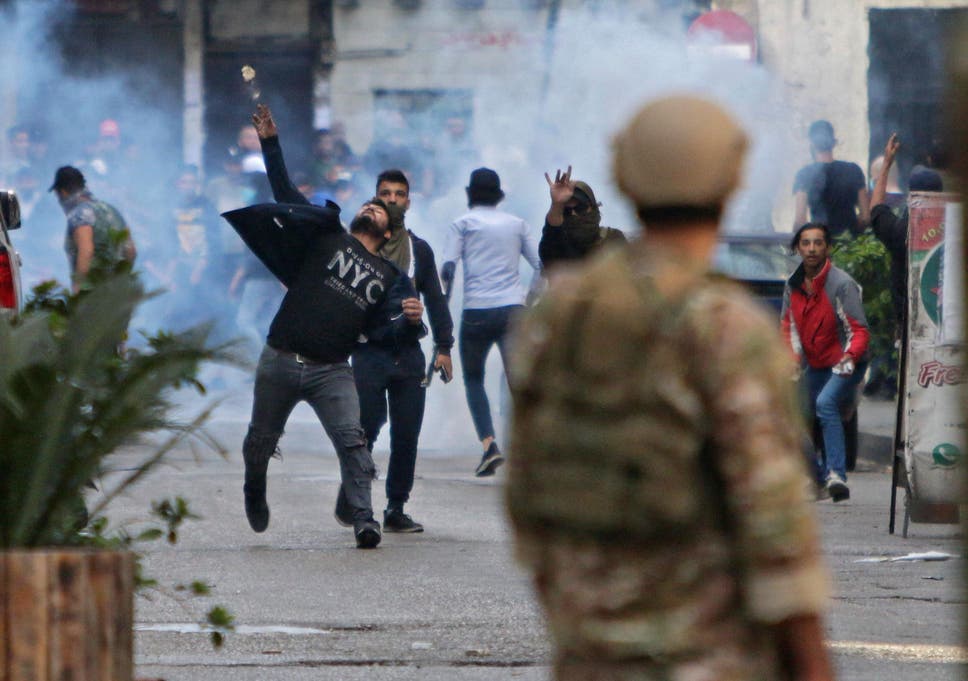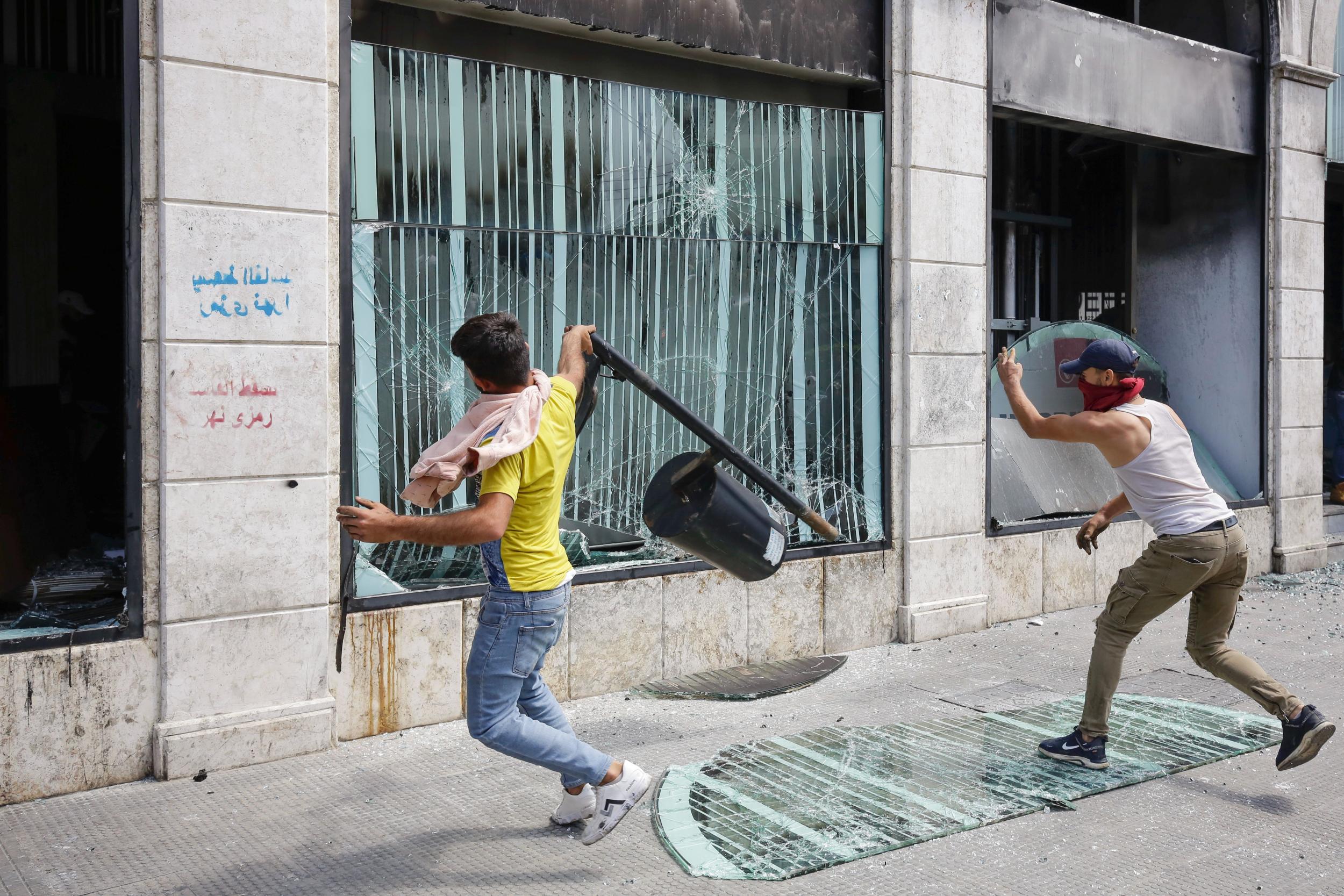
With tyres burning bright behind him, a desperate Lebanese protester screams at a scrum of officers trying to clear the road: “I swear to God, we are starving.”
One of the soldiers, in a surgical mask and military fatigues, shouts back with equal despair: “I’m hungrier than you.”
The stark scene captured on video during a recent protest in an area north of Beirut hammered home the intensity of the economic collapse that is ravaging Lebanon.
Across the country, protesters have defied the coronavirus curfew and social distancing measures, to take to the streets and express their fury at the country’s worst financial crisis since the 1975-1990 civil war.
With households scrabbling to put food on the table – and no obvious way to solve the crisis – looming economic meltdown has sparked fears the country may descend back into a civil conflict.
On Tuesday, groups firebombed cash machines in Lebanon’s north and angry rallies gathered around the Central Bank in Beirut, as the local currency plunged to a record low of 4,300 lira to the dollar on the black market, now deemed to be the realistic rate. The official exchange rate, meanwhile, remains pegged at 1,500.
Crowds also chanted against soaring prices caused in part by the collapse of the currency: the cost of staples such as sugar has risen by nearly 70 per cent while vegetables have doubled over the last year.
With more people on the streets despite a lockdown, clashes turned deadly overnight Monday in Tripoli, a northern city with one of the highest unemployment and poverty rates in the country.
Twenty-six-year-old protester Fawwaz Fouad Al-Seman died from wounds after being shot by security forces who, according to Human Rights Watch, fired live ammunition in what the advocacy group described as excessive force.
The Lebanese military issued a statement expressing their “profound regret” at the killing. They said their forces came under fire from Molotov cocktails and a hand grenade injuring 40 of their men in Tripoli on Monday alone.
The fatality ratcheted up tensions.
On Tuesday, furious mourners attended an emotional funeral procession in Tripoli, where angry gunmen opened fire in the air.
In Beirut, hundreds rallied outside the Central Bank to mark Fawaz’s passing and to express their anger over the political and economic crisis now exacerbated by the coronavirus pandemic and a severe lockdown that has crippled public life and commerce.
There, protesters told The Independent they were preparing for mass rallies across the country on Friday. They feared the country descending into a civil conflict again, as people had little else to do but take to the streets and stay there.
“The situation is worse than bad – people cannot afford to buy milk for their children or bread for their family. Nothing is affordable, I mean literally nothing,” said Jack, 36.
“I have two degrees – hotel management and physiotherapy – and no job. Explain to me how I can possibly put food on the table?”
Rooted in decades of corruption, and chronic mismanagement, Lebanon’s economic troubles came to a head last autumn after foreign investment and remittances from wealthy Lebanese abroad dried up, sparking an uprising against the ruling elite.
The situation was only made more acute when the coronavirus pandemic arrived.
So far, 710 people have been confirmed to have contracted Covid-19 and 24 people have died.
The government rolled out a strict lockdown and curfew, closing the airport, borders and businesses, piling further pressure on the country’s 6 million people, which includes hundreds of thousands of vulnerable Syrian and Palestinian refugees.
The World Bank had already grimly projected that 40 per cent of people in Lebanon would slip under the poverty line by the end of 2020, meaning they live off a few dollars a day. But the economy minister believes that is now outdated and the true figure is closer to 50 per cent.
Lebanon’s social affair minister told CNN on Wednesday that three-quarters of the country now relies on aid.
The country – the third most indebted in the world – is poorly placed to help the impoverished. It defaulted again in March on foreign debts. Aid packages for poorer citizens have been announced but not implemented.
Economists and experts told The Independent the “ad hoc” way the Central Bank was handling the crisis was contributing to the mess.
To try to replenish foreign currency reserves and possibly to reduce the gaps in banks’ balance sheets, the Central Bank has slapped harsh controls on people’s foreign and domestic currency accounts, issuing a slew of opaque and sometimes contradictory circulars, only stoking public anger and panic further.
It is now near impossible to access dollars in Lebanon, devastating for a country which heavily relies on the US currency. Some 70 per cent of all customer deposits are in dollars.
Last week, the Central Bank said that any depositors with foreign currency stuck in the banking system could withdraw their money in the rapidly depreciating Lebanese lira, at a market exchange rate set by the banks daily that does not reflect the realistic black market rate.
That decision was also applied to international money transfer companies, such as Western Union, which must now issue cash in local currency again at this daily set special rate.
Then on Sunday night, the Central Bank instructed currency exchange shops not to sell the dollar for more than 3,200 lira. Security forces were ordered to detain several exchange shop owners for violating the decree, prompting a number of places to go on strike until the detainees are freed.
Experts say rather than helping, the Central Bank’s slew of diktats has reduced the amount of dollars in the market and swamped it with an overload of Lebanese lira, encouraging panic and driving up the black market price even further.
Even the Lebanese prime minister, Hassan Diab, accused Riyadh Salameh, the Central Bank’s governor, of triggering hyperinflation.
Mr Diab, whose government came into office in January, suggested that Mr Salameh was keeping details of the financial situation secret, including bank losses estimated to be as high as $3bn in the last month alone.
He said previously that the numbers show $5.7bn in deposits have left the banks between January and February, adding to the liquidity crunch and what he called a financial “black hole”.
“The Central Bank is either incapable, absent or directly inciting this dramatic depreciation,” Diab said in a televised speech last Friday.
“The public is paying the price for this policy,” he added.

Mr Salameh, the Central Bank’s governor since 1993, defended his record on Wednesday, rejecting the prime minister’s criticism that he was to blame for the financial crisis or that the bank had been hiding information.
He also denied Mr Diab’s claims that billions of dollars have left the country. He instead blamed previous governments spending money on unnecessary imports over the last few years for the fact the country’s foreign reserves were drained.
“Yes the Central Bank financed the state but it is not the one that spent the money. There are those who spent the money,” he said, adding he had been targeted in a “systematic campaign”.
No one knows exactly what happened or the real extent of the damage as a lot of information is not publicly available.
“There is clearly a very acute shortage of dollars in the system… but we don’t know because the central bank books are closed,” said Maha Yahya, director of the Carnegie Middle East Centre.
“There is no plan in place. My biggest fear is we are seeing more violence and chaos, as people are starting to go hungry.”
Sami Nader, director of the Levant Institute for Strategic Affairs, warned that the Lebanese lira could tank to 10,000 to the dollar by the end of the month.
“What is worrying me is there is nothing on the horizon – they are not taking any measures to fix the problem,” he said.
“We are in freefall without a parachute. Meanwhile the Central Bank is stumbling against the position of the government and the prime minister. The conflict at the head of the pyramid is adding to the uncertainly of the market.”
At money transfer shops in Beirut, employees spoke of a grim future, saying that foreign currency has pretty much gone while the Lebanese lira was increasingly worthless.
“People have money in their accounts that they can’t get out, they are forced to watch their savings disintegrate into nothing, while the Central Bank performs magic tricks,” said one employee, asking not to be named for fear of reprisal from the authorities.
“In short, it is the robbery of the people.”







